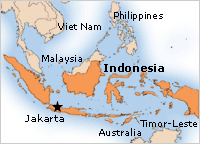
At least 16 people died, and thousands of houses collapsed or had their roofs blown off after typhoon Xangsane swept through central Vietnam Sunday, state television VTV said Monday.
The Vietnam Central Steering Committee for Flood and Storm Prevention said lightning, flying debris, house collapse, electrocution and even falls into open trenches caused the deaths during the storm.
Babara Green, an Australian tourist currently in Danang said this was beyond her imagination. “Too terrible”, she commented.
Several locals told Thanh Nien this was the largest storm they had ever encountered.
Water rising
In general, the water level is still rising in the central region as of Sunday night.
Danang province suffered the most deaths with 4 perishing in the massive tropical storm.
In Lien Chieu and Son Tra districts, 47 and 10 locals were injured respectively.
Over 5,500 houses had their roofs blown off completely, nearly 10,000 trees were uprooted or felled, 780 electric posts knocked down, and over 2,500 houses submerged under water.
The typhoon ripped roofs off 90 percent of houses and nearly all state agencies and schools in Lien Chieu district.
A series of enterprises in Lien Chieu Industrial Zone have been forced to halt production due to the storm.
In Thua Thien Hue province, 43 were injured and 14,660 roofs blown off houses.
The storm has inundated the former imperial city of Hue under 0.3 to 1.5 m of water and submerged 16,760 houses there.
Most traffic routes in the city are flooded.
Some 21 state buildings in sectors like posts, education, and health either collapsed or lost their roofs altogether.
Even more danger is looming with the rising water level in the O Lau River.
A 30-year-old herdsman died in Quang Tri province after being struck by lightning. Here, 274 houses were completely destroyed, with 100 seriously ravaged.
In Quang Binh province, 6 were injured, and around 2,000m of coast in Hai Trach commune were stripped away.
Good news comes from Quang Ngai province where only 5 were slightly injured as the province has succeeded in evacuating 20,000 residents to safety.
At least 15 houses totally collapsed, 15 vessels sunk or went missing. Material damage in Quang Ngai is estimated at VND15 billion (US$937,500).
From Thursday night through Friday morning, heavy winds and downpours swept through Ly Son district, uprooting hundreds of trees and blown off roofs of over 800 houses in the district alone.
The district is still marooned as all routes in and out have been cut, with part of their embankment destroyed.
In Duc Pho district, heavy rains ripped away nearly 2,000m of dikes, leaving water to rush onto the Sa Huynh salt field.
The typhoon has inundated 33,700 ha of paddy rice and destroyed 10 reservoirs in Binh Dinh province.
Provincial authorities in Binh Dinh have earmarked VND2 billion ($125,000) for medicine and food for victims.
Nothing short of a bomb raid
Routes linking the UNESCO-recognized Hoi An Ancient Town in Quang Nam province to Danang city – a commercial hub in central Vietnam – were also devastated.
Phan Thang An, chairman of the People’s Committee of the Quang Nam’s Thang Binh district said “it is nothing short of a bomb raid” when referring to the destruction in his region.
One woman perished in Quang Nam, as a house collapsed onto her.
Most of the 5,000 residents in Quang Nam who were earlier evacuated have safely returned, only to find their homes gone.
Deputy Prime Minister Nguyen Sinh Hung and agriculture minister Cao Duc Phat visited Hoi An ancient town Sunday afternoon to instruct and supervise works at repairing an embankment along the Hoai River, and other tourist regions along the coast.
Hung praised Hoi An’s prompt evacuation had brought about minor damage. He highlighted the safe evacuation of nearly 500 international tourists in the town.
Nearly 10,000 locals out of 15,000 who had been evacuated have returned.
Only 5 were slightly injured in the heritage town but 50 percent of houses and two churches lost their roofs to the typhoon.
However, thanks to reinforcement efforts, 47 houses bearing historical significance had been propped up and escaped damage during the raging storm.
Some 100 fishing vessels, 3 hydrofoils, and two tourist canoes were sunk.
As of Sunday afternoon, Dinh Ban district was still isolated as routes in and out were cut off.
Some 27,800 houses in the region had their roofs ripped off, with 5,740 collapsed completely.
Water in the Thu Bon River is also rising past alarm levels.
Dong Giang district in the town was also cut off from the outside in the wake of the storm.
Devastation
Reuters Sunday reported Vietnam had carried out the biggest evacuation operation in 30 years as 200,000 people in four central Vietnamese provinces had been evacuated.
The typhoon killed at least 61 when it hit the Philippines three days ago.
Xangsane is the 18th storm of this year's Pacific cyclone season.
Last year about 50 people were killed when eight typhoons and tropical storms hit Vietnam, Nguyen Tien Toan, a senior official at the National Steering Committee for Flood and Storm Prevention, said recently.
National weather forecasters said the typhoon would skirt important coffee-growing areas in the Central Highlands, but that Kontum, the smallest coffee-growing province, would be affected over the next two days.
Vietnam is the world's second largest coffee grower after Brazil.
Reported by Thanh Nien reporters – Translated by Hoang Bao
Read more!
![]() The world’s biggest Bell, the world’s largest book, Gravity defying rock, one legged rower and vegetable plantation floating above the water and one of the world’s earliest civilization can all be found in one place. That is Golden Land, Myanmar!!!
The world’s biggest Bell, the world’s largest book, Gravity defying rock, one legged rower and vegetable plantation floating above the water and one of the world’s earliest civilization can all be found in one place. That is Golden Land, Myanmar!!!


















